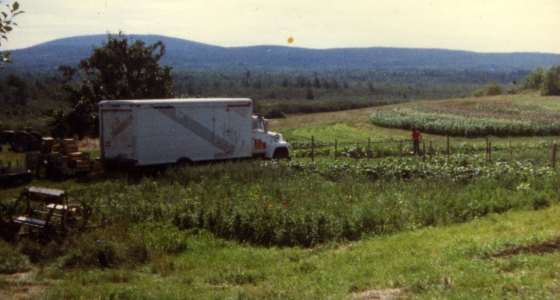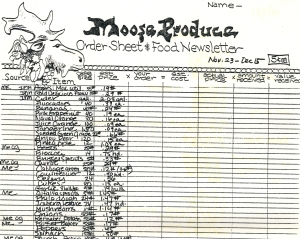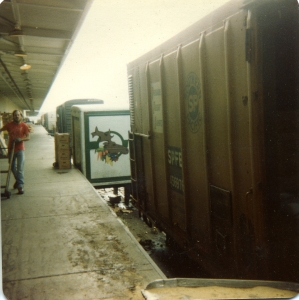as told by Tom
Roberts, one of its founders.
From 1980 to 1983, Moose Produce was a Unity, Maine, based five member worker collective that ran a weekly produce and cheese delivery truck from Boston to Maine's food co-ops from Saco to Downeast and Aroostook. One of it's aims was to integrate as much local produce as possible into the demand that it was feeding, as well as to be a supplier of Maine local produce to the coop warehouse in Boston. This is the story of how it grew out of the co-op movement of the 1970's and where it's legacy can be seen today. Others who were involved with Moose Produce are invited to expand upon—and perhaps correct— what they find here.
Background:
The 1970's were a decade of rapid growth of
pre-order co-ops—or buying clubs as they are now known. They
were initially organized primarily by hippies from the back to the
land movement for the purpose of sending a truck to Boston to buy
natural foods and bring it back for distribution. Soon many local
regular straight folks got involved because they liked the
community-based system, and also liked to save money on good food.
Dividing a truckload of food was found to be simpler if it were done
in several stages, first breaking it into towns, then folks from each
town taking it to their neighborhoods and breaking it down into
families. The decentralized paradigm for growth was essential for
handling the large amounts of food and for managing the whole
operation. When each local town's order grew too big to bring back to
their town's breakdown in a station wagon or pickup, they split in
two. When the whole organization got too big, that is, when more than
a single truckload of food was being ordered, the regional group also
split in two, so that the food could again fit into a single truck.
Mostly we were using U-Hauls, but some were hiring semis to haul the
food from Boston, usually as a back-haul. These runs were done on a
quarterly basis. Once these organizations were in place, many of
these groups also began using this same system for doing monthly
produce and cheese orders.
By the late '70's there were around a dozen regional coops each made up of six to twelve buying clubs each, and they would send a U-Haul truck to the New England Produce Center (NEPC) in Chelsea, Mass. and then over to the NEFCO (New England Food Cooperative Organization) Warehouse in Cambridge to load up with produce and cheese. NEFCO (later called Northeast Cooperatives) started as a brokerage service at NEPC for buying clubs and co-op stores and over the years evolved into a local produce, cheese and natural foods warehouse. Each Regional Co-op would make the trip to Massachusetts on a monthly basis.
On whole other track, the Maine Federation of Co-ops (FEDCO) was created in 1973 with two grants totaling $70,000, with the stated purpose of aiding all Maine's co-ops to work together. It was started by a Bowdoin College graduate (Jay Robbins) who designed this projects as his senior thesis, but had little experience with the burgeoning growth of buying clubs that was happening independently. A staff of five people was hired, surveys were taken from all the co-ops they could find, and data amassed. A few projects were attempted with varying degrees of success. By 1975, with most of the grant money used up, a meeting was called for the express purpose of figuring out what to do next.
Our proposal was to unite the whole state's natural foods ordering system into a Maine-based warehouse system, where whole truckloads of product could be purchased for lower prices, and distributed to the regional natural foods co-ops for minimal markup. The chief organizers of several of the regional co-ops were hired on as staff, and most of the old staff left. This new staff consisted of Tom Roberts and Silvia Marsh of Coordinated Produce*, Richard Murray and Deanne Herman of Western Coordinated Produce*, Ken Morse of GUTCO*, Larry Rider of the Greater Coastal Body*, and Lucinda Talbot, who was the only original staff person from the Federation of Cooperatives to stay on board. This was the beginning of the FEDCO warehouse, which stayed in business until about 1985, when it dissolved and was absorbed by Northeast Cooperatives. FEDCO first operated out of Hallowell, then moved to North Vassalboro, and finally to Winslow, each time moving into a bigger space. FEDCO warehouse was operated as a for-profit wholly owned subsidiary of the non-profit Federation of Cooperatives.
As an aside, in 1978 CR Lawn approached the Federation of Cooperatives with a plan to do a state-wide garden seed order, which would be called FEDCO Seeds. It was enthusiastically approved.
As a further aside, the Maine Organic Farmers and Gardeners Association (MOFGA) had begun doing annual orders of soil amendments, called Organic Growers Supply, Inc. This was done as a pre-order and involved arranging for a box car of Rock Phosphate, and truckloads of various other cheap, heavy goods to two or three distribution points around the state, usually Portland, Lewiston and Bangor. Farmers would arrive with their vehicles at the appointed day and take away their regional share, to be divided at another location. This was done by volunteers on a rotating basis, and lasted about six or seven years. Logistics was always a nightmare. There was a small overlap between OGSI participants and the food coop movement.

Before the paint job: Moose Produce truck at Peacemeal Farm, 1981.
But What About Moose?
By 1979 many of the all-volunteer
or low-paid folks running the regional produce cooperatives were
getting frayed around the edges. Meanwhile, at FEDCO Warehouse the
advantages of a state-wide network had become apparent, and many new
contacts had been made, many new co-ops begun. Tom Roberts of FEDCO
Warehouse and Kip Penney of Waterville's Hungry Chuck's Inevitable
Food Co-op began talking about the possibility of a business
dedicated to supplying the independent co-ops, the regional produce
co-ops, and the dozen new co-op storefronts with produce and cheese
with a weekly run to the NEPC and NEFCO Warehouse, and integrating
local produce whenever and wherever possible. The idea was to offer
customers their existing range of produce but offer them the option
of both substituting local produce for imported, and supplying us
with local produce from their local suppliers. We new we wanted a
catchy name, and after a few brainstorming sessions came up with
“Moose Produce” which we adopted because of the
alliteration and because the name identified us with local Maine
produce.
We started with several mailings to all the co-ops, letting them know this project was in the works and providing a suggested list of cheese and imported and local produce, and of delivery schedules and routes. We hired Sam Sanborn, a Hungry Chuck's worker, to do the phone calling, order collating on paper, and calling in the orders to our suppliers. The artist in Sam was apparent when she designed and oversaw the painting of our truck. We also hired Spruce Whited who had worked with Coordinated Produce as a driver and warehouse worker. CR Lawn was our treasurer for a year. Kip, Spruce and I were the primary drivers and warehouse workers throughout the time Moose Produce was in business, and several others worked with us for varying numbers of months. We began by adding a 5% markup to everything, later raised to 7%, charging the same to everyone no matter where they were in the state. This low markup allowed us to grow rapidly, but in retrospect failed to allow us to earn enough to stay in business for the long run. Part of the difficulty is raising the markup was that many of the customers would simply drive to Massachusetts themselves if our prices were too high.
Altho we were all steeped in cooperatives and all of our prospective customers were coops, we opted for organizing Moose Produce as a worker-owned company, primarily because it enabled us to adopt a more streamlined form of decision making. This decision raised a few eyebrows at the outset, and the accusation of “going over to the other side” was one of the early hurdles we had to overcome. Moose was incorporated in Maine as a for-profit corporation.

Partial Moose Produce order sheet, fall 1981. The order sheet took up two sides of a legal size
sheet. (click either pic to enlarge)
In May of 1980 we rented a GMC straight truck from a Motor Truck and Trailer truck rental company in Winslow. Later we leased a heavier Ford straight truck from Lily Truck Rental in Portland. This is the truck in the pictures, first unpainted, then with a view a part of the logo we painted on both sides one sunny day. During the last year of our history we rented a used Mercedes from a sympathetic former wholesaler in Unity, Jim Kinney of Jim's Produce. It had about a half million miles on it, but was our favorite truck.
It should be mentioned that this was done at the dawn of the home computing era. There was no email, no web pages, no Internet at all. Sam's husband Alan helped us all a great deal by using BASIC to program his Commodore VIC-20 to generate price lists and invoices for Sam. He had to install more memory for the computer to handle the big program and data files required—I think he got up to 48K of RAM by the end.
Moose Produce started by making weekly runs to NEPC and NEFCO Warehouse, and by our third year were making runs twice a week. We numbered all of our truck runs, from M-1 for the first weekly run, M-2 for the second weekly run, and so forth. Twice weekly runs were M-55a and M-55b. We also did a few runs to other New England locations during seed potato season. During M-89, we delivered to two locations in New Hampshire, five in Massachusetts, seven in Vermont, and thirty-six in Maine―it was a busy week! Each run back from Mass. had at least two drivers and usually had two stages; the run from Mass. to our warehouse in Unity, where we would off-load the truck and re-sort the load, pulling orders for the second leg of the run, with a different driver. On first leg of the run we dropped several orders in Portland and any other orders we had along I-95 in the south. This made loading the truck in Mass. a bit tricky, since we had to do some pulling of orders for early deliveries as we loaded. The alternative was to backtrack to the south to make those deliveries, which we rarely did.
Our routes went from Portland to Belfast along the coast, inland to Lewiston, Farmington and Bangor, and the Downeast and Aroostook runs. In our runs to Aroostook, we picked up several varieties of potatoes. In spring of 1981, we began offering seed potatoes for the planting season as well. The idea of carrying certified seed potatoes interested NEFCO, as well as Squash Trucking (from Western Massachusetts), and Vermont Produce, both of whom were regularly picking up at NEFCO Warehouse and NEPC. Each spring for a few years one of our runs into Boston was full of potatoes. We called this part of our operation “Moose Seeds”, a play on the names Moose Produce and FEDCO Seeds, but our “seeds” were relatively cheap and heavy, and needed to be kept cold and not allowed to freeze, as contrasted to FEDCO's garden seeds. We started thinking of seed potatoes, but soon realized there were several other items that were similar in their requirements, and that were inappropriate for FEDCO Seeds to carry.
About the time of the beginning of Moose Produce in 1980, I moved to Peacemeal Farm in Dixmont. Peacemeal was growing sunchokes and shallots, so we added the option to buy those along with seed potatoes. Johnny's Selected Seeds was willing to sell us a large number of bushels of Stuttgarter onion sets, so we added those to our price list. We located a grower of asparagus crowns in New Jersey (a major asparagus growing area and where new asparagus varieties are developed), and would buy 15,000 or so Jersey Giant crowns each spring.
When it finally became clear, in spite of all our energy, good ideas and great connections, that Moose Produce was losing too much money to continue, we ceased operations around the early spring of 1983. We were all also very tired from the enormous amount of work it took. I “retired” to farming at Peacemeal, Kip “retired” to Angelina's Bakery in Brooks, and Spruce kept renting the Mercedes and ran the business under another name for several more months. To see Moose Produce go under was a heartbreak for all involved, customers and workers alike.
After Moose Produce was no more, I went to FEDCO to see if they would like to take over Moose Seeds. They were enthusiastic about the idea, but were unable to handle it until the following year. So for that one year (1983) I did the Moose Seeds order by myself. The following year FEDCO did take it over, re-naming it Moose Tubers. Today you can still see Sam's artwork in some of the goofy potato drawings in the Moose Tubers section of the FEDCO Seeds catalog.
Around that same time, MOFGA approached FEDCO Seeds with the idea of handling the soil amendment orders instead of doing it through the Organic Growers Supply, Inc. volunteer pre-ordering system. Today, Organic Growers Supply makes up the third section of the FEDCO Seeds catalog. FEDCO Seeds and its divisions (Moose Tubers, Organic Growers Supply, Bulbs, and Trees) are the surviving legacy of the Federation of Cooperatives.
Author's note:
When I
realized that many folks would like to hear the story of Moose
Produce, I knew that I should review all the stuff I still had and
write a definitive history. I have made an attempt at doing that, and
have posted what I have so far as a web page. During the last 25
years most of the reams of paper I had from that time have been
dispersed to the winds of time, and altho I have found some, I am
still searching for more.

---------------------------------------------------
* These were the names of the regional produce and/or natural foods ordering groups.
